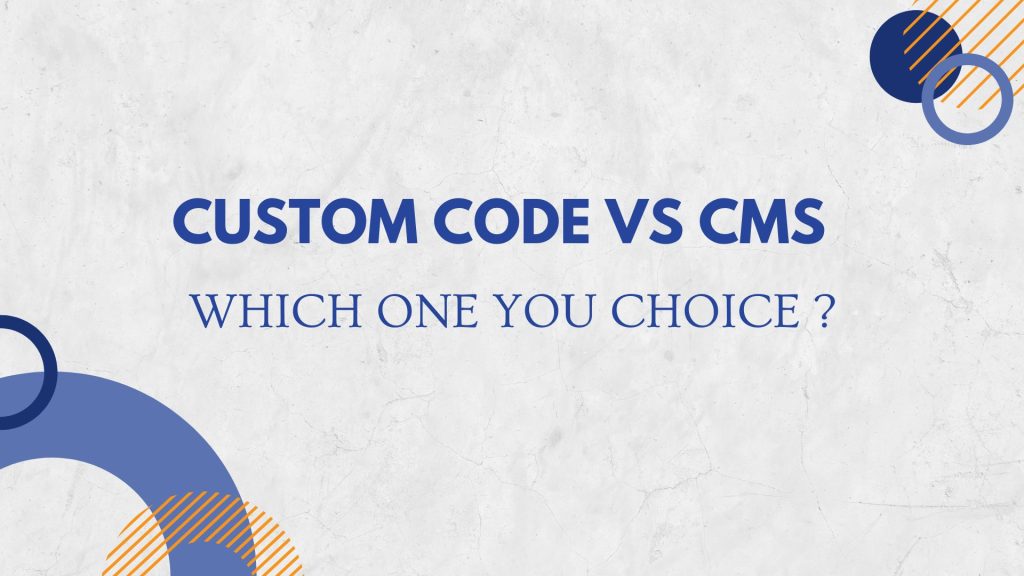Table of Contents
In the ever-evolving digital landscape, building a website is essential for any business or individual seeking online presence. However, the method chosen for website development can significantly impact its success. In this article, we will explore the advantages and disadvantages of building a website with custom code vs Content Management System (CMS), helping you make an informed decision that aligns with your unique needs and goals.
Understanding Custom Code Website Development:
Custom code website development involves building a website from scratch, tailoring every aspect to meet specific requirements. This approach provides unparalleled flexibility and control over design and functionality. With custom code, developers can create a website that perfectly matches your vision and brand identity. Additionally, custom-coded websites often exhibit optimal performance and faster loading times, enhancing user experience and search engine rankings. However, this route may require a longer development time and higher initial costs, as skilled developers are needed to create and maintain the site.
Exploring Content Management Systems (CMS):
On the other hand, CMS platforms, such as WordPress, Joomla, or Drupal offer a user-friendly interface that simplifies website management. CMS users can choose from an extensive range of templates and themes, enabling quick and cost-effective website setup. Furthermore, CMS platforms boast a robust plugin ecosystem, allowing users to extend the website’s functionality without extensive coding knowledge. While CMS platforms offer convenience, they may have design limitations compared to custom-coded websites. Moreover, security concerns may arise from using third-party plugins, and excessive plugins can impact website performance.
Pros and Cons of Custom Code vs Content Management System (CMS):
We have discussed here pros and cons of custom code vs content management system in brief
Pros and Cons of Building with Custom Code:
Pros:
Complete Control: Custom code allows full control over design and functionality, catering to specific requirements.
Optimal Performance: Websites built with custom code tend to be faster and more efficient, providing a better user experience.
Higher Security: A tailored approach to security can reduce vulnerability to cyber threats and attacks.
Cons:
Longer Development Time: Custom coding demands more time, which can delay the website launch.
Higher Initial Costs: Due to the need for skilled developers, the initial investment for custom code websites may be higher.
Limited CMS-like Features: Non-technical users might find it challenging to manage content without CMS-like features.
Pros and Cons of Using a Content Management System (CMS):
Pros:
Quick and Cost-effective Setup: CMS platforms streamline website development, allowing for rapid deployment.
User-friendly Interface: Content management becomes effortless, empowering non-technical users to maintain the website.
Extensive Plugin Library: CMS users can enhance their website’s functionality through a variety of available themes, page builders and plugins.
Cons:
Limited Design Flexibility: CMS themes and templates might restrict design possibilities.
Security Concerns: Relying on third-party plugins could expose the website to security vulnerabilities.
Performance Issues: Overusing plugins can lead to bloated code and slower page load times.
Assessing Your Website Needs and Goals:
Before choosing between custom code and a CMS, assess your project requirements, budget constraints, and timeline expectations. Consider the technical expertise available within your team and evaluate long-term scalability and expansion plans for your website.
Case Studies: Real-Life Examples:
To better understand the outcomes of both approaches, we examine successful websites built with custom code and those utilizing CMS platforms. Learn from the unique features and functionalities implemented and apply the lessons learned to your project.
Expert Insights: Developers and Website Owners Speak Out:
We interview experienced developers who have worked with custom code and website owners who have utilized CMS platforms. Their insights and experiences will help you gain valuable perspectives and make an informed decision for your website development.
Custom code vs Content Management System (CMS) is a debate that has been ongoing in the world of website development for quite some time. Both approaches offer unique advantages and cater to different needs, making it essential to understand the differences to make an informed decision.
Custom code website development involves building a website from scratch, giving developers complete control over every aspect. This approach is favored by businesses and individuals seeking a highly customized online presence. With custom code, websites can be tailored to match specific branding requirements and design visions, providing a unique and distinctive look and feel. Additionally, custom-coded websites often boast optimal performance and faster loading times, contributing to an enhanced user experience and better search engine rankings.
On the other hand, Content Management Systems offer a user-friendly and efficient way to build websites without extensive coding knowledge. CMS platforms come with pre-designed templates and themes, simplifying the development process and reducing costs. They empower even non-technical users to manage and update website content seamlessly, making them a popular choice for businesses with limited resources or technical expertise. CMS platforms also benefit from a wide array of plugins that extend functionality, allowing users to add features like e-commerce, contact forms, and social media integration effortlessly.
When it comes to building a website, the choice between custom code vs Content Management System depends on your specific needs and goals. By considering the pros and cons of both approaches, you can make a well-informed decision that leads to a successful and effective online presence. Remember to prioritize factors like design flexibility, budget, and scalability to ensure your website meets your expectations and achieves your desired outcomes.



